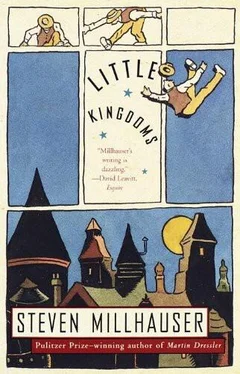Steven Millhauser
Little Kingdoms
The Little Kingdom of J. Franklin Payne
One warm blue night toward the middle of July, in the year 1920, John Franklin Payne, a newspaper cartoonist by trade, looked up from his desk in the third-floor study of his home in Mount Hebron, New York, and saw with surprise that it was three o’clock in the morning. The world was absolutely still. Through the windows the sky was a deep, glowing blue, as if there must be a bright moon somewhere, and Franklin felt a sudden desire to burst through the window into the blue night sky. The desire startled him, for he liked to work alone in his tower study late into the night. The study was warm, uncomfortably warm; despite the new screen in the lower half of the center window, the small room held the heat of the roof.
In the hot stillness Franklin took off his vest and looked again at the glass-cased clock on top of his high-backed desk. The glass door with the brass handle, the lacy clock-hands, the exposed cogwheels, the big metal key lying under the swinging pendulum, all this seemed strange and unseen before, though the clock had stood on the mantelpiece of his parents’ home in Ohio since his earliest childhood; and the familiar, strange clock, the glowing sky, the mysterious hour, all seemed connected with something inside him that was about to burst. As he stared at the pendulum he began to notice that the stillness of the hour was really a secret riot of sound: the dark tick of the clock, like drops of water dripping from an eave, the shrill of crickets beyond the screen, and under it all, clearer and clearer, the gentle rasp of his wife’s breathing as it came through the open window of the second-floor bedroom. He had told Cora he would be done in an hour or so, but the six-panel strip had proved unexpectedly stubborn. And then he had laid aside his drawing board, that smooth-worn dark board with a faint shine that reminded him of the shine of a well-handled pipe, and with a sense of excitement he had brought out the packet of carefully trimmed rice paper, set up his other board with its glass window, pulled over his jar of Venus pencils and a fresh bottle of black drawing ink, and set to work on his secret, exhilarating project.
What to do? If he went down to his bedroom next to Cora’s on the second floor, and fell asleep instantly, he would get only two and a half hours of sleep before the rattle of milk bottles in the wire box on the front porch announced his five-thirty rising. But Franklin was too excited to sleep. He was excited by the glowing blue sky, by the clamorous silence, by his lamplit tower room high above the rest of the house, by the sense that he was creating a world far more enchanting than the world of his comic strips, which had already brought him a certain notoriety. He was bursting with energy. He thought how nice it would be to creep downstairs and slip into bed with Cora — but she would be angry if he woke her. For though Cora was given to passionate whims of her own, she did not like to be surprised. Franklin remembered that a colleague was coming up for a visit on Saturday, and he had a sudden misgiving about Max: suppose Cora — but there was no use worrying about it now. He decided to work straight through the night. Immediately he decided not to. His eyes ached, his temples throbbed, his hand had become slightly unsteady — the last drawing had almost been spoiled.
Franklin numbered the piece of rice paper carefully in the lower right-hand corner and added it to the pile of thirty-two new drawings, each of which had been traced over the preceding drawing and exactly resembled it except for a small departure. Each of the separate drawings still had to be gone over in ink and then mounted on a piece of cardboard in order to be examined in his viewing machine. He now had 1,826 India-ink drawings, which had taken him almost three months to complete. At sixteen frames per second he would need nearly 4,000 drawings for a four-minute animated cartoon.
Franklin pushed back his chair carefully, for Cora complained that she could hear his chair scrape even though her room was not directly below the tower study, and walked over to the center window. He had inserted the adjustable screen only three weeks ago, after a hard-shelled insect had come in at night through the raised sash and struck his drawing hand like a piece of flying tin. Down below, the shadow of the house fell halfway across the sloping lawn. He saw plainly the elongated tower with the pointed roof, from which he was looking down into the yard, and for a moment he had the odd sensation that he was down there, strewn across the lawn — at any moment his shadow-form would emerge from the shadow-tower and pass into the brightness of the moon. Under one of the high old maples a child’s table, set with cups and saucers and teapot, lay half in light and half in shade: one chair, pulled back slightly, glowed almost white, while the other chair lay in black shadow. The brilliant spout of the teapot looked like the raised trunk of an elephant. He would have to remind Stella to bring in her toys before dark — or maybe the dolls had come out to have a tea party under the summer moon. In his childhood home in Plains Farms, Ohio, he had heard things come alive at night: dolls woke from their daylight spell, teapots poured tea, dishes came down from their cupboards and walked about the house, clowns in jigsaw puzzles rose up and danced, the little boy in the wallpaper caught a fish with his yellow fishing pole. Franklin had lain very still, listening to the secret life in the house, and twenty years later he had put it all in a Sunday color strip — but in the last panel the boy had wakened from his dream. And one summer night in Ohio, Franklin himself had sat up in bed and pushed aside the curtain and the stiff, heavy shade to stare at the brilliant backyard. He had longed to pass through the window into the dark enchantment of the summer night; and in the morning when he opened his eyes he found he had fallen asleep with his head against the window frame. Franklin was restless. The tower study was unbearably hot. All at once he had a marvelous idea.
With a thrust of his palms he pushed up the half-open lower sash. The adjustable screen, framed in maple, fit snugly against the vertical parting-strips that ran the length of the window frame and separated the upper and lower sashes. He released the stiff spring, carefully removed the screen, and placed it on the floor against the side of his desk. Then with dream-ease he stepped out into the blue summer night.
A narrow roofslope lay directly beneath the window. On his knees, backward, Franklin made his way to the edge. There, as if he knew what he was doing, he slid over the roof edge and swung down; for a moment he hung wildly before dropping to the wide and nearly flat roof of the front porch.
He was standing beside the tall window of his own bedroom, directly beneath his tower study. The shade was pulled down all the way, as if he were inside, fast asleep. And for a moment he imagined himself lying fast asleep in his bed, dreaming this other Franklin, who had stepped out of a tower into the sky. Franklin strode past the window, noticing himself passing jauntily in the dark pane of the upper sash — and how easy it was to walk this way, along the shingles of a roof, with one’s hands in one’s pockets at the magic hour of three in the morning; he felt like kicking up his heels. But he slowed as he drew near Cora’s window.
Through the adjustable screen he saw Cora lying on her back with her unbound hair strewn over the pillow. He could make out the proud line of her forehead and thought he could see, escaping from her thick pale tumble of hair, the bottom of an ear. Franklin felt a little sharp burst of longing, and with a feeling of dream-freedom he released the steel spring that held the screen tight against the window frame. At that moment Cora turned slightly in her sleep, half opened an eye, and seemed to look at him.
Читать дальше












